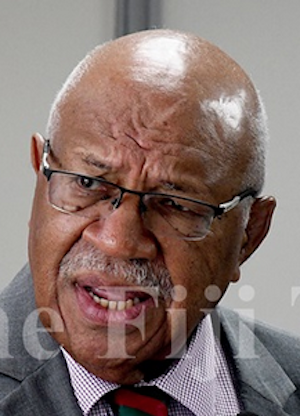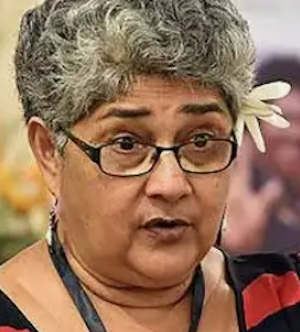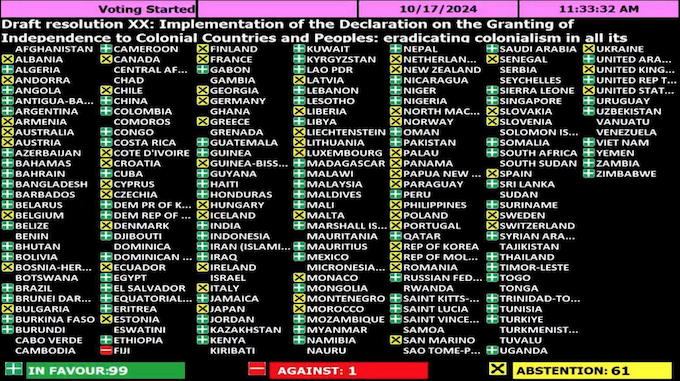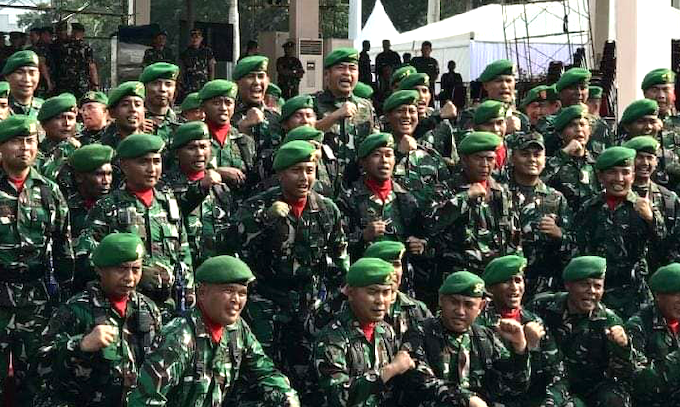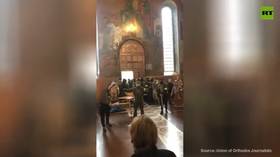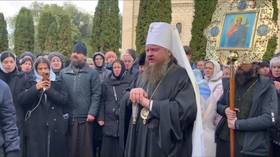After a full year of unbridled genocide in Gaza, escalating slaughter in the West Bank, and now similar crimes inflicted on the Lebanese, Britain’s brand-new prime minister Keir Starmer made this astounding announcement the other day: “We stand with Israel.”
He also has the UK military helping to protect Israel from Iran’s rockets while doing nothing to defend unarmed Palestinian women and children from the daily carnage inflicted by Israel’s “most moral” military.
He refers to Hamas’s murderous breakout last October 7 but never mentions Israel’s massacres and other atrocities against Palestinians in the decades leading up to October 7. Yet he practised as a human rights lawyer and was Director of Public Prosecutions. Would you believe it?
So what makes Western leaders abandon all sense of justice, all common sense and all norms of human decency in order to support, protect and supply a rogue regime in its lust to dominate, oppress, steal and butcher? Why such adoration for Israel in our corridors of power? Nobody I’ve spoken to can understand it.
But it looks like the culprit could be America’s QME doctrine. In 2008 Congress enacted legislation requiring that US arms sales to any country in the Middle East other than Israel must not adversely affect Israel’s “qualitative military edge” (QME).
Ensuring the apartheid state always has the upper hand over it neighbours
Legislation defines QME as “the ability to counter and defeat any credible conventional military threat from any individual state or possible coalition of states or from nonstate actors, while sustaining minimal damages and casualties, through the use of superior military means, possessed in sufficient quantity, including weapons, command, control, communication, intelligence, surveillance, and reconnaissance capabilities that in their technical characteristics are superior in capability to those of such other individual or possible coalition of states or nonstate actors.”
In a speech to the Washington Institute for Near East Policy on 4 November 2011, Andrew Shapiro (Assistant Secretary for the Bureau of Political-Military Affairs at the State Department), enlarged on QME saying: “As a result of the Obama Administration’s commitment, our security relationship with Israel is broader, deeper and more intense than ever before. One of my primary responsibilities is to preserve Israel’s Qualitative Military Edge, or QME. This is not just a top priority for me, it is a top priority for the Secretary and for the President.
“It is widely known that our two countries share a special bond that is rooted in our common values and interwoven cultures…. We are committed to that special bond, and we are going to do what’s required to back that up, not just with words but with actions.’
“The cornerstone of America’s security commitment to Israel has been an assurance that the United States would help Israel uphold its qualitative military edge. This commitment was written into law in 2008 and each and every security assistance request from the Israeli Government is evaluated in light of our policy to uphold Israel’s Qualitative Military Edge.”
‘Strongly in sync’
Shapiro explained how, for three decades, Israel had been the leading beneficiary of US security assistance through the Foreign Military Financing programme (FMF) which was providing $3 billion per year for training and equipment. A 2007 memorandum of understanding provided for $30 billion in security assistance over 10 years, allowing Israel to purchase the sophisticated defence equipment it needs to maintain its qualitative military edge. 60 percent of US security assistance funding to some 70 countries went to Israel.
And here’s the funny bit. Shapiro claimed: “Our support for Israel’s security helps preserve peace and stability in the region. If Israel were weaker, its enemies would be bolder. This would make broader conflict more likely, which would be catastrophic to American interests in the region. It is the very strength of Israel’s military which deters potential aggressors and helps foster peace and stability. Ensuring Israel’s military strength and its superiority in the region, is therefore critical to regional stability and as a result is fundamentally a core interest of the United States.”
That’s worked well, hasn’t it?
“The United States also experiences a number of tangible benefits from our close partnership with Israel. For instance, joint exercises allow us to learn from Israel’s experience in urban warfare and counterterrorism.” Yes, gained from decades of assaults, bombardments and brutal persecution of the captive Palestinian people under Israeli military occupation.
“Israeli technology is proving critical to improving our Homeland Security and protecting our troops. One only has to look at Afghanistan and Iraq…..
“Israel is a vital ally and serves as a cornerstone of our regional security commitments. From confronting Iranian aggression, to working together to combat transnational terrorist networks, to stopping nuclear proliferation and supporting democratic change and economic development in the region – it is clear that both our strategic outlook, as well as our national interests are strongly in sync…. Our security assistance to Israel also helps support American jobs, since the vast majority of security assistance to Israel is spent on American-made goods and services.”
It was then time for him to demonise Iran. “The Iranian regime continues to be committed to upsetting peace and stability in the region and beyond. Iran’s nuclear program is a serious concern, particularly in light of Iran’s expansion of the program over the past several years in defiance of its international obligations.”
Speaking of international obligations, how safe is the region under the threat of Israel’s nukes? Why is Israel the only state in the region not to have signed the Nuclear Non-Proliferation Treaty? Are we all supposed to believe that Israel’s 200 (or is it 400?) nuclear warheads pose no threat? Why hasn’t Israel signed the Biological and Toxin Weapons Convention, and why has it signed but not ratified the Comprehensive Nuclear Test-Ban Treaty, similarly the Chemical Weapons Convention?
Shapiro went on: “Iran’s support for Hezbollah and Hamas enables these groups to fire rockets indiscriminately at Israeli population centers.” A bit like America’s support for the Israeli Offence Force then. “Iran’s extensive arms smuggling operations, many of which originate in Tehran and Damascus, weaken regional security and disrupt efforts to establish lasting peace between Israel and its neighbors. As change sweeps the region, Iran has and should be expected to continue its attempts to exploit much positive change for its own cynical ambitions.”
And are we to believe that Israel’s long-term illegal occupation of its neighbours’ territories such as Gaza, the West Bank, the Golan Heights and Shebaa Farms has nothing whatsoever to do with the Zionists’ “cynical ambitions”? Has it never occurred to the Americans that Israel’s QME — all that power in the hands of an abusive regime — makes peace impossible? It is deeply worrying that successive US administration don’t seem to realise that Israel doesn’t want peace and never has — that peace gets in the way of its territorial ambitions. Or has America indeed realised this and made it part of the US’s “cynical ambition”.
Shapiro complained that despite its instability Syria was still providing Hezbollah with critical military and logistical support and that Syria might be supplying sophisticated missile technology. Perhaps he forgets that Hezbollah was set up in 1982 by Muslim clerics to fight the Israeli invasion of Lebanon.
“For six decades, Israelis have guarded their borders vigilantly,” he said. But he surely knows that Israel has never declared its borders for the simple reason it intends to constantly expand them.
“We are taking steps to help Israel better defend itself from the threat of rockets from Hezbollah and Hamas. This is a very real daily concern for ordinary Israelis living in border towns such as Sderot, who know that a rocket fired from Gaza may come crashing down at any moment.” Funny he should mention Sderot, now home to Israeli land-grabbers. It is built on the lands of a Palestinian village called Najd, which was ethnically cleansed by Jewish terrorists in May 1948 before Israel declared itself a state. The 600+ villagers, all Muslim, were forced to flee for their lives.
Najd was not allocated to the Jews in the 1947 UN Partition Plan, they stole it using armed force. Britain, the mandated government, was in charge while this and many other atrocities were committed by rampaging Jewish militia, Najd being one of 418 Palestinian villages and towns they wiped off the map. Its 82 homes were bulldozed and their inhabitants, presumably, became refugees in nearby Gaza. Their families are probably still living in camps there. The sweet irony is that some of them are quite likely manning the rocket launchers.
Being a target for Gaza’s rockets and only a mile from the prison camp fence, Sderot has become known as ‘the bomb shelter capital of the world’, residents having little time to take cover. It is now a major propaganda asset of the Israeli regime and a compulsory stop on the brainwash tour for gullible politicians and journalists. When Barak Obama visited in 2008 he said: “If somebody was sending rockets into my house where my two daughters sleep at night, I would do everything to stop that, and would expect Israel to do the same thing.” Yes, Mr Obama. But hopefully you wouldn’t be such a plonker as to live on land stolen from your neighbour at gun-point.
Shapiro revealed that the funding for Iron Dome was above and beyond the $3 billion from FMF. He also remarked that “many Israeli officers and enlisted personnel attend US military schools such as the National War College. These personnel exchanges allow Israel’s future military leaders to acquire essential professional skills, as well as build life-long relationships with their U.S. military counterparts.”
So it really is a cosy setup.
Additionally, “Israel benefits from a War Reserve Stockpile that is maintained in Israel by US European Command. This can be used to boost Israeli defenses in the case of a significant military emergency…. Israel is also able to access millions of dollars in free or discounted military equipment each year through the Department of Defense’s Excess Defense Articles program.”
Sheer bribery
Shapiro also touched on how the US keeps other nearby nations sweet. “Our longstanding friendship and our extraordinary relationship of cooperation is reflected in the more than $300 million in security assistance that we provide Jordan annually…. For the past 30 years, the peace treaty between Israel and Egypt has served as the basis for the $1.3 billion in annual Foreign Military Financing (FMF) that we provide Egypt. This assistance helps Egypt maintain a strong and disciplined professional defense force that is able to act as a regional leader and a moderating influence. Our assistance helps build ties between militaries, ensures that foreign militaries conduct themselves in restrained and professional ways, and creates strong incentives for recipient countries to maintain good ties with the United States.
“We have continued to rely on Egypt to support and advance US interests in the region, including peace with Israel, confronting Iranian ambitions, interdicting smugglers, and supporting Iraq.”
Shapiro was also aware of diplomatic efforts from some quarters to question Israel’s legitimacy. “As the President has said, Israel’s legitimacy is not a matter for debate. We have consistently opposed efforts to isolate Israel. We have stood up strongly for Israel and its right to defend itself…. We have refused to attend events that endorse or commemorate the flawed 2001 World Conference Against Racism, which outrageously singled out Israel for criticism. This Administration has also made clear that a lasting and sustainable peace can only come though negotiations and remains firmly opposed to one-sided efforts to seek recognition of statehood outside the framework of negotiations, whether in the UN Security Council or other international fora.”
QME’s collision with international law
He was referring, presumably, to those same old lopsided negotiations that have led nowhere. Israel has no claim to self-defence against a threat emanating from a territory it belligerently occupies. That has been made perfectly clear by the UN and other authorities. It’s the Palestinians who have a cast-iron right to self-defence, using “armed struggle” if necessary, against Israel’s illegal military occupation and murderous oppression (UN Resolutions 37/43 and 3246). UN Resolution 3246 also calls for all States to recognize the right to self-determination and independence for all peoples subjected to colonial and foreign domination and to assist them in their struggle.
Furthermore Palestinians should not have to negotiate their freedom and self-determination – it’s theirs by right and doesn’t depend on anyone else, such as Israel or the US, agreeing to it. The US, UK and Israel (the latter stating repeatedly that it will not allow a Palestinian state to be created) arrogantly ignore the rights of others. But legal opinion (Wilde) has it that when 138 of the world’s states at the UN General Assembly voted in 2012 to re-designate Palestine’s status from ‘non-member Entity’ to ‘non-member State’, this had the effect of establishing statehood.
Seriously, could no-one see that America’s crooked QME doctine would clash with justice and international law?
A further boost to this US-Israel love affair came in July 2012 with an Act called the United States-Israel Enhanced Security Cooperation Act of 2012. It included the following policy statement:
(1) To reaffirm our unwavering commitment to the security of the State of Israel as a Jewish state. As President Barack Obama stated on December 16, 2011, ‘‘America’s commitment and my commitment to Israel and Israel’s security is unshakeable.’’ And as President George W. Bush stated before the Israeli Knesset on May 15, 2008, on the 60th anniversary of the founding of the State of Israel, ‘‘The alliance between our governments is unbreakable, yet the source of our friend ship runs deeper than any treaty.’’.
(2) To help the Government of Israel preserve its qualitative military edge amid rapid and uncertain regional political trans-formation.
(3) To veto any one-sided anti-Israel resolutions at the United Nations Security Council.
(4) To support Israel’s inherent right to self-defense.
(5) To pursue avenues to expand cooperation with the Government of Israel both in defense and across the spectrum of civilian sectors, including high technology, agriculture, medicine, health, pharmaceuticals, and energy.
(6) To assist the Government of Israel with its ongoing efforts to forge a peaceful, negotiated settlement of the Israeli-Palestinian conflict that results in two states living side-by-side in peace and security, and to encourage Israel’s neighbors to recognize Israel’s right to exist as a Jewish state.
(7) To encourage further development of advanced technology programs between the United States and Israel given current trends and instability in the region.
Policy (6) is nonsensical given the Israelis’ continuing refusal to recognize Palestine’s right to statehood, the recent passing of nation state laws reinforcing Israel’s apartheid, and the sidelining of international law and justice in seeking instead to settle the Israeli-Palestinian conflict by arm-twisting negotiation.
Need to eliminate the Zionist Tendency
As Shapiro reminded his audience, President Truman famously took just 11 minutes to extend official, diplomatic recognition to the State of Israel when it was founded in 1948. He didn’t even have the sense to sleep on it, and the US’s unwavering commitment to Israel’s security has been one of the fundamental tenets of America’s national security ever since. While Truman, a self-declared Zionist, felt sorry for “the victims of Hitler’s madness” his hasty decision created millions of victims of Israel’s evil intent, which was so obvious from the start and is now laid bare for all to see.
It seems as if the UK has been roped in and superglued to America’s ridiculous infatuation with the apartheid regime and its genocidal maniacs. Here it’s a criminal offence to show support for Hamas or Hezbollah, but it’s business as usual with the loathsome regime in Israel. Clubs supporting Israel are still allowed to flourish at Westminster.
Our new trade secretary Jonathan Reynolds is reported to be in talks with a minister in Tel Aviv, Nir Barkat, who is one of the more extreme proponents of Israel’s brutal war in Gaza. The department says: “Our teams will be entering negotiating rooms as soon as possible, laser-focused on creating new opportunities for UK firms”, while British embassy officials in Israel talk about the “tremendous opportunity for collaboration between Israeli and British companies”.
Reynolds was responsible for the decision to end a mere 30 out of the 350 arms export licences to Israel, which was widely considered insufficient for sending the right message. Unsurprisingly Reynolds is a vice-chair of Labour Friends of Israel. As such he appears to be in breach of the Government’s Ministerial Code and Principles of Public Life which state that “holders of public office must avoid placing themselves under any obligation to people or organisations that might try inappropriately to influence them in their work….. They must declare and resolve any interests and relationships.” But people with such dangerous affiliation are allowed to occupy many senior Government positions.
The influence of the Israel lobby is so strong, and its enforcers so enmeshed in the fabric of Westminster politics, that politicians feel they must join their party’s Friends of Israel group and undergo indoctrination to qualify for a senior position.
With American presidents and senior politicians “either side of the aisle” so firmly shackled to Israel’s nauseating ambitions, it’s no surprise that their poodle, the UK, is similarly compromised. Successive prime ministers and their foreign secretaries have been amazingly keen to endorse Israel’s sense of impunity and grovel to its stooges inside and outside Westminster. How are we to rid ourselves of this malign influence?
One of the first tasks in securing peace is to purge the ‘Zionist tendency’ from all corridors of power in the West. This is where the problem lies. These are Israel’s pimps and stooges who identify with Zionism and promote its sinister and unlawful ambitions inside the UK and other Western parliaments. They are the root cause of strife in the Middle East. Time they were removed.
The post
UN’s High Ideals Brought down by American Legislation first appeared on
Dissident Voice.
This post was originally published on Dissident Voice.
